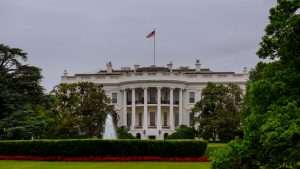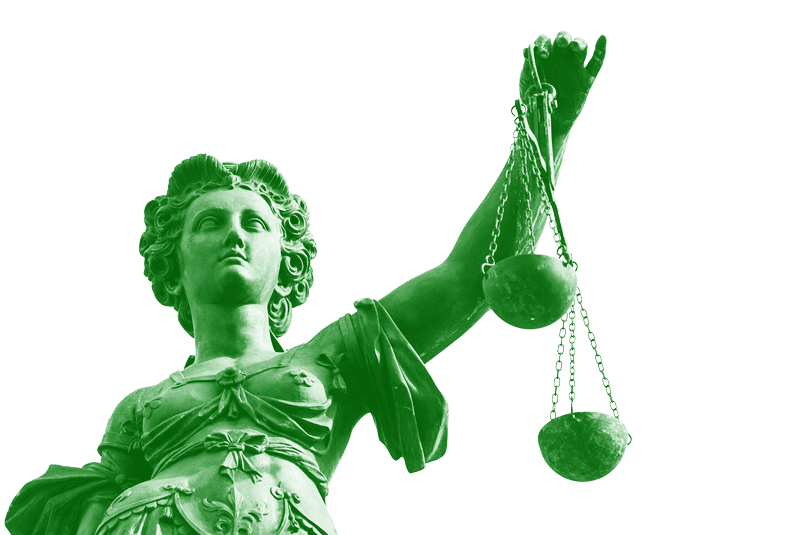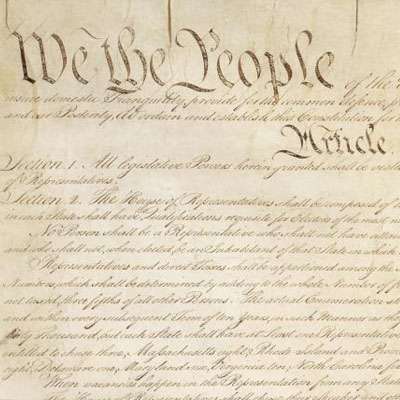
There is an ongoing debate over whether Donald Trump should be disqualifed from holding public office in the future, under Section 3 of the 14th Amendment, which states that "No person" can hold any state or federal office if they had previously been "a member of Congress, or… an officer of the United States" or a state official, and then "engaged in insurrection or rebellion against the same, or given aid or comfort to the enemies thereof." Whatever other issues the Trump case raises, it seems obvious that the presidency is an "office…under the United States," and therefore that Trump can be disqualified, so long as he met the other requirements of Section 3. However, a number of prominent commentators and legal scholars claim otherwise, including former attorney general Michael Mukasey, Josh Blackman and Seth Barrett Tillman, and - most recently - Steve Calabresi.
Advocates of the claim that Trump is exempt from Section 3 don't deny that the presidency is an "office." They can't because the Constitution refers to it as such multiple times! Rather, they claim it is not an office "of the United States."
While these critics have impressive credentials, their argument is badly flawed. It has no basis in the original meaning of Section 3, and it leads to absurd conclusions.
The absurdity is clear. If the presidency is not covered by Section 3, that means a president who engaged in insurrection or aided the "enemies of the United States" is not disqualified from future office-holding even though almost any other federal official who did the same thing would be. Surely an insurrectionist who held the highest office in the land is much more of a menace to the republic than one who was merely a low-level federal bureaucrat. It makes no sense to disqualify the latter, but not the former. Indeed, it might be more logical to penalize insurrectionists who held high office more severely than those who held lower ones.
Similar absurdity arises if we apply this theory to the Impeachment Clause of Article I, which states that "Judgment in Cases of Impeachment shall not extend further than to removal from Office, and disqualification to hold and enjoy any Office of honor, Trust or Profit under the United States" (emphasis added). As Blackman and Tillman have previously argued, their theory leads to the conclusion that the Senate can bar an impeached and convicted office-holder from lower federal executive offices, but not the presidency. Again, this is absurd. If such a person cannot be safely trusted to be a low-level bureaucrat, he surely cannot be trusted with the vastly greater power of the presidency.
Some try to square this circle by arguing the presidency is exempted because it is an elected office. But Section 3 specifically bars members of Congress, who are also elected. Given the Founding Fathers' deep suspicion of pure democracy, it is unlikely they would exempt the presidency from post-impeachment disqualification for that reason. And such reasoning is even less likely on the part of the framers of the Fourteenth Amendment. A big part of the reason for enacting Section 3 in the first place was the fear that southern white voters in ex-Confederate states would be motivated to elect ex-Confederate insurrectionists.
Both Section 3 and post-impeachment disqualification are limitations on democracy, intended to prevent voters from choosing candidates who are a threat to the constitutional order, and ultimately to liberal democracy itself. In this respect, they are similar to other democracy-protecting limitations on democracy included in the Constitution and in the laws of other liberal democratic states.
Given the absurd consequences of the idea that the president is exempt from Section 3, proponents of that theory bear a very heavy burden of proof. Longstanding rules of legal interpretation - and common sense - disfavor absurd results, at least if there is a defensible non-absurd interpretation.
And here there pretty obviously is: the president is an "officer" no less than other executive branch officials, and therefore can be disqualified under Section 3. Similarly, impeached and convicted officers - including the president - can be barred by the Senate from holding the presidency in the future (as well as other offices).
This approach is also supported by the original meaning of Section 3. As Steve Calabresi admits, and Mark Graber shows in detail (here and here), the congressional drafters of the 14th Amendment routinely spoke of the presidency as an officer of or "under" the United States and gave no indication it was somehow exempt. Will Baude and Michael Stokes Paulsen provide additional evidence to this effect in their important article on Trump and Section 3, which jump-started this entire debate.
Standard originalist theory holds that the relevant original meaning is that understood at the time the provision in question was enacted. Even if, as Calabresi and others argue, the understanding of "under" was different in 1787, at the time the original Constitution was enacted, that cannot trump (or Trump!) contemporaneous evidence from the time of the enactment of Section 3 eighty years later.
Language usage changes over time, and the relevant usage (at least for originalists) is that at the time of enactment, not some earlier period. For example, the Guarantee Clause of Article IV refers to protecting states against "domestic violence." In the usage of the time that means protecting them against internal rebellion, not the kind of abuse in the household that "domestic violence" refers to today. But if, in 2023, we were to enact a constitutional amendment requiring states to combat "domestic violence," we would use the modern definition, unless there were strong evidence that the framers and ratifiers thought they were enacting the archaic one.
Perhaps things are different if the term "officer of the United States" is a legal term of art. Sometimes legal language assigns different meanings to words than ordinary language. But there is no evidence that, in 1868, "officer of the United States" was such a generally understood legal term of art. The drafters of the Amendment - many of them lawyers themselves - certainly did not see it that way.
If they did intend to exclude an insurrectionist president from the scope of Section 3, such a momentous - and ridiculous - distinction would surely have been noted and debated. The absence of any such debate is further indication that no such exception was made. It's a proverbial dog that didn't bark.
If we believe, as many originalists do, that constitutional text should be interpreted as understood by ordinary readers, rather than legal experts, the case against exclusion is even more overwhelming. No reasonable ordinary person would assume that the presidency is not an "office" included in the text of Section 3, or that an insurrectionist president should be treated more leniently than a low-level flunky who did the same thing.
Defenders of the exclusion theory mostly rely on inferences from the text of the 1787 Constitution to make their case. For reasons already noted, those inferences can't trump the text and original meaning of 1868. But even on their own terms, they are inadequate.
Calabresi summarizes one such inference:
The Commission Clause of Article II, Section 3 imposes a duty on the President: "he "shall" i.e. must "Commission all the Officers of the United States." (emphasis added). This is done by the President signing a document called a commission formally appointing executive and judicial branch officials to their offices. No President has ever, either before or after, the ratification of the Fourteenth Amendment commissioned himself. Why? Because the President is not technically "an officer of the United States."
My answer is that the President does indeed "commission" himself. He does so by taking the oath of office required by the Constitution. Without that, he cannot take office, just like lower-level officers cannot do so without a commission issued by the president. The forms are different. But the substance is similar. Alternatively, we can plausibly interpret the Commission Clause as only applying to those officers whose positions are not already otherwise authorized by the Constitution. This strains the text; but it is less absurd than excluding the president from disqualification.
Calabresi also cites the Appointments Clause of Article II:
[T]he Appointments Clause of Article II: "[The President] shall nominate, and by and with the Advice and Consent of the Senate, shall appoint Ambassadors, other public Ministers and Consuls, Judges of the supreme Court, and all other Officers of the United States, whose Appointments are not herein otherwise provided for, and which shall be established by Law:". Here again the phrase: "Officer of the United States" is used to describe appointed persons and not elected persons like the Members of Congress or the President. The Appointments Clause thus bolsters the implication of the Commissions Clause. Presidents are not, technically, Officers of the United States" as that phrase is used as a legal term of art in the Constitution.
Here, we have an even more obvious response. The clause only covers those officers "whose Appointments are not herein otherwise provided for" (emphasis added). That of the president, of course, is provided for in the constitutional provisions under which he is chosen by the electoral college.
I don' think election and appointment are mutually exclusive terms here. Rather, election is one mechanism by which a person can be appointed. That's especially true if the election in question was not (as under the original Constitution) intended to be by the people as a whole, but by a small group of elites - the electoral college (chosen by state legislatures in ways that at that time were not required to be democratic). The Framers (wrongly, it turned out) expected the electors to exercise discretion rather than simply defer to the voters in their states.
"Appointment" by means of a vote conducted by a small elite group is a concept that makes linguistic sense. Indeed, we academics routinely use the term in that way when we refer to the "appointment" of new faculty members by a vote of the current faculty.
Finally, there is the Impeachment Clause:
It provides that "The President, Vice President and all civil Officers of the United States, shall be removed from Office on Impeachment for, and Conviction of, Treason, Bribery, or other high Crimes and Misdemeanors." Note that the President and Vice President are mentioned –alone and separately from – "all civil Officers of the United States."
Here again there is a compelling and simple response. The president and vice president are not purely "civil" officers. The president is also a military officer: the Constitution makes him commander-in-chief of the armed forces! The VP is less clearly military, but he succeeds to the military authority of the president if the latter dies, resigns, or is removed from office. Thus, he has a military role, as well. Separately listing the president and VP precludes claims that their mixed civil-military status exempts them from impeachment.
I don't claim my interpretations of these three provisions are incontestable. There is some textual ambiguity in all of them. But, textually, they are at least as plausible as the exclusionist alternative. And they should be preferred to the latter because they avoid ridiculous and absurd results. On top of that, they are more consistent with the original understanding of Section 3, and with the way a reasonable ordinary reader would read that provision.
Not everyone is an originalist, of course. I won't here go into the living constitution case against excluding the president, because it is fairly obvious: doing so excludes the holder of the very office that is likely to be most dangerous to the republic if it falls into the hands of an insurrectionist or an abettor thereof.
Finally, I fully recognize there are other objections to excluding Trump under Section 3 (e.g. - claims that he did not actually engage in or aid an insurrection). There are also pragmatic slippery slope concerns, some of which I addressed here. Some of these arguments are more weighty than the presidential exclusion theory. But we should at least clear the deck of the latter.
UPDATE: In the original version of this post, I erred in focusing on the phrase "office…under the United States" as opposed to "officer of the United States." I apologize for the mistake, which I have now corrected. But all the same points apply.




Show Comments (195)